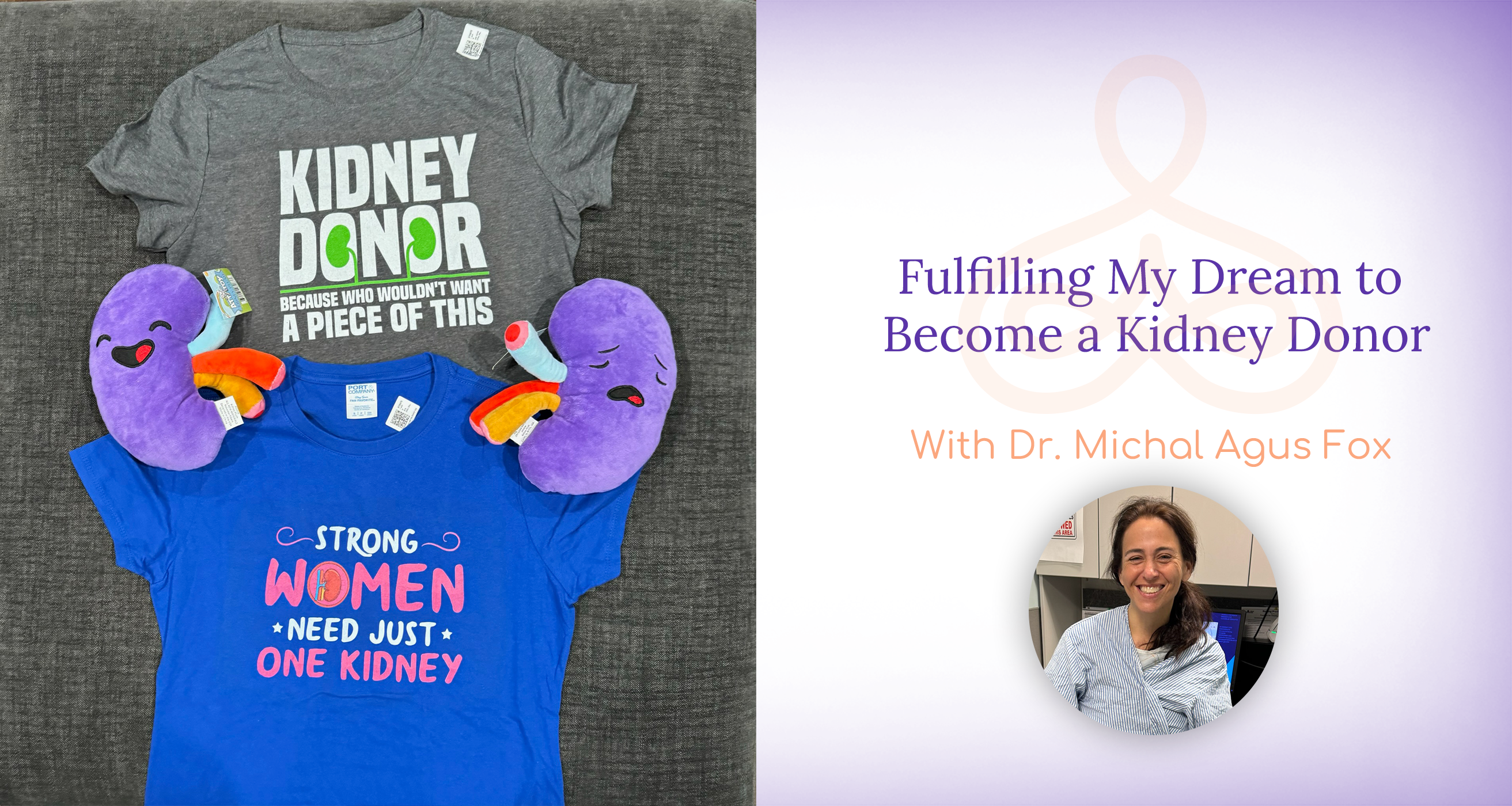In a recent episode of the Healthful Woman podcast, titled “Fulfilling My Dreams to Become a Kidney Donor,” Dr. Nathan Fox discusses with Michal her decision to donate one of her kidneys. She discusses her journey to becoming a living donor, her kidney donor surgery experience, and her feelings about kidney donation.
Michal’s Journey
Michal’s journey to kidney donation began when a parent in one of her daughter’s class needed a kidney. While deceased donor kidney transplants are common, living donations offer better benefits to the kidney recipients. “There was somebody in one of our daughter’s classes whose parent needed a kidney. And there was this campaign for everyone to kind of swap and see if they could match for him. And many of us did that at that time. We were put into a Mount Sinai hospital registry and I did not match.” Though she was not a match, it inspired her to donate. Having lost people she could not save, Michal felt called to help. She had previously been a match for bone marrow but couldn’t donate due to Hashimoto’s. Later, she discovered Renewal, an organization that helps facilitate kidney donations. After sending in a swab test, she emailed them every year to express her desire to donate a kidney as a living kidney donor.
Michal’s Kidney Donation Match
Ten years after first reaching out, Michal received the news only four days after her fiftieth birthday. She received a phone call from Renewal stating that she was a match. She was overjoyed, jumping up and down while on the call. Though she was advised to take time to think and talk to her family, she already knew her answer and called back just 12 hours later. Though some advised her to save her healthy kidney in case a relative needed one, she learned that donating puts her and her first-degree relatives at the top of the transplant center list if ever needed. This policy is part of programs which support living donor transplants.
Michal’s Intentions
During the call, she learned about the kidney recipient. “They told me he’s a man. He’s about 71 or 72. And he said, ‘I’m going to stop right here. A lot of people don’t want to donate to somebody who’s in their 70s.’ And I said to him, ‘That’s not going to stop me.’ For Michal, it was about saving a life, regardless of the individual’s age or circumstances. “And granted, you have these romantic feelings of like visions of donating to someone who’s two years old, let’s say, or a young mother or young father or whatever it is that goes through your head when you’re saving someone’s life. For me, it was never about that. It was out of my hands. I was just thrilled to be able to prolong someone’s life.”
The Donation Process
Each hospital handles kidney transplants and living kidney donations differently. Hers would be at Mount Sinai East, a leading transplant center. After virtual appointments with a social worker, nurse, and coordinator, she underwent in-person evaluations, including CAT scans, blood work, a mammogram, colonoscopy, pap smear, psychological evaluations, and more. During the process, she felt “as if they were wanting to talk her out of the procedure and felt as if she was being judged for wanting to donate her kidney.” After passing all the tests, she underwent two weeks of pre-operative and final testing. Michal expressed, “It’s really interesting because it’s very vulnerable. You know, I’m sitting on in the preop room. I’m all, you know, gowned up and I have all this stuff coming out of my arms. And, you know, and then to hear like, wait, this there’s a chance that this may not happen today is very humanizing. Very humanizing.”
Before surgery, she and her kidney recipient couldn’t meet, but he wrote her a letter, “Dear donor, I’m writing to you with overwhelming gratitude, heartfelt appreciation for the incredible gift you have given to me. Words can’t express the depth of my gratitude for your generosity and kindness. Your decision to donate a part of yourself to someone in need is nothing short of heroic. You have shown me the true meaning of compassion, empathy and humanity. Once again, from the bottom of my heart, thank you. You will always hold a special place in my heart, and I will forever be grateful for your extraordinary act of kindness with deepest gratitude.”
Michal’s Recovery and Feelings on Kidney Donation
Post kidney donor surgery, Michal experienced pain from her donated kidney once off narcotics but managed with Tylenol. Within a few days, she began walking, starting at two miles and increasing to four. Michal expresses, “For me, it’s all about what I got out of it. There’s no question. I feel like my journey is really only beginning with it. Again, for me, it’s kind of gave me this connection to God, which I hadn’t necessarily felt in a long time. Just how lucky I am that I was able to donate is really my feelings on this. I would do it again. I would encourage anyone to do it if they can.”
Learn More
For more information on the Healthful Woman podcast, listen to the full episode today. Patients needing a colonoscopy, mammogram, or pap smear beforehand can reach out to Carnegie Women’s Health for more information by completing the online contact form. You can also learn more about the transplant team process, whether considering a living donor kidney transplant or awaiting a deceased donor, and how organizations like Renewal and the National Kidney Registry help match donors and recipients, supporting those with kidney disease and kidney failure.

